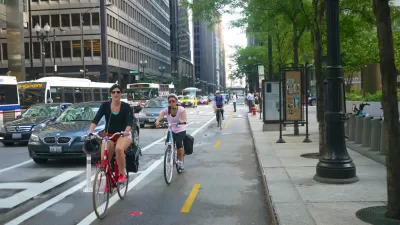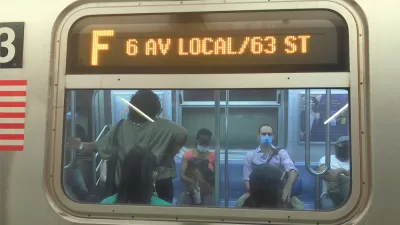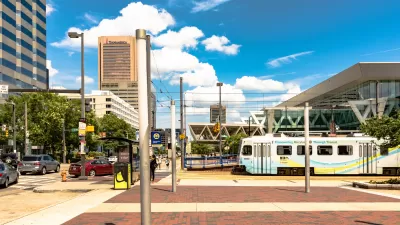The U.S. House of Representatives approved the Health and Economic Recovery Omnibus Emergency Solutions Act earlier this month. Transit advocates say the bill reinforces the car-centric status quo.

"The latest COVID-19 relief bill perpetuates some of the worst aspects of American transportation policy — and barely acknowledged how our transportation realities have shifted in the wake of the pandemic," according to Kea Wilson's assessment of the HEROES Act.
The Health and Economic Recovery Omnibus Emergency Solutions Act has been approved by Democrats in the House of Representatives, but Senate Republicans have been less than supportive, so the bill is likely to change substantially if it is approved.
Among the spending included in the proposed $3 trillion bill are $15 billion for the Federal Highway Administration to distribute to transportation departments across the country and $16 billion for public transit. "Advocates quickly questioned both numbers — the former because it was too large, and the latter because it was too small," according to Wilson.
As explained by Wilson, the American Association of State Highway Transportation Officials has been lobbying for funding to deal with anticipated shortages of transportation revenues as people stay home and drive less at unprecedented levels. Planetizen has covered news about expected gas tax revenue declines in Missouri and California.
On the transit side, the American Public Transportation Association earlier this month requested $23.8 billion in emergency funds to support public transit, so the HEROES Act falls far short.

Planetizen Federal Action Tracker
A weekly monitor of how Trump’s orders and actions are impacting planners and planning in America.

Restaurant Patios Were a Pandemic Win — Why Were They so Hard to Keep?
Social distancing requirements and changes in travel patterns prompted cities to pilot new uses for street and sidewalk space. Then it got complicated.

Map: Where Senate Republicans Want to Sell Your Public Lands
For public land advocates, the Senate Republicans’ proposal to sell millions of acres of public land in the West is “the biggest fight of their careers.”

Maui's Vacation Rental Debate Turns Ugly
Verbal attacks, misinformation campaigns and fistfights plague a high-stakes debate to convert thousands of vacation rentals into long-term housing.

San Francisco Suspends Traffic Calming Amidst Record Deaths
Citing “a challenging fiscal landscape,” the city will cease the program on the heels of 42 traffic deaths, including 24 pedestrians.

California Homeless Arrests, Citations Spike After Ruling
An investigation reveals that anti-homeless actions increased up to 500% after Grants Pass v. Johnson — even in cities claiming no policy change.
Urban Design for Planners 1: Software Tools
This six-course series explores essential urban design concepts using open source software and equips planners with the tools they need to participate fully in the urban design process.
Planning for Universal Design
Learn the tools for implementing Universal Design in planning regulations.
Heyer Gruel & Associates PA
JM Goldson LLC
Custer County Colorado
City of Camden Redevelopment Agency
City of Astoria
Transportation Research & Education Center (TREC) at Portland State University
Camden Redevelopment Agency
City of Claremont
Municipality of Princeton (NJ)





























